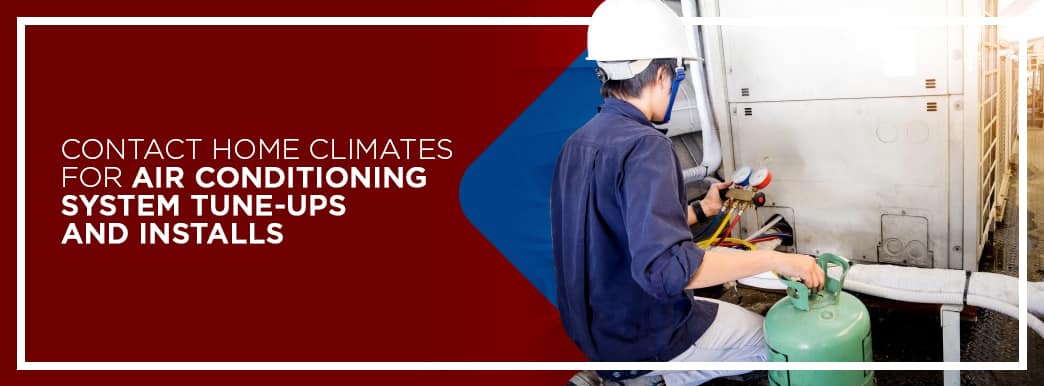What is R22 and How Does It Affect You?
Dec 31, 2019
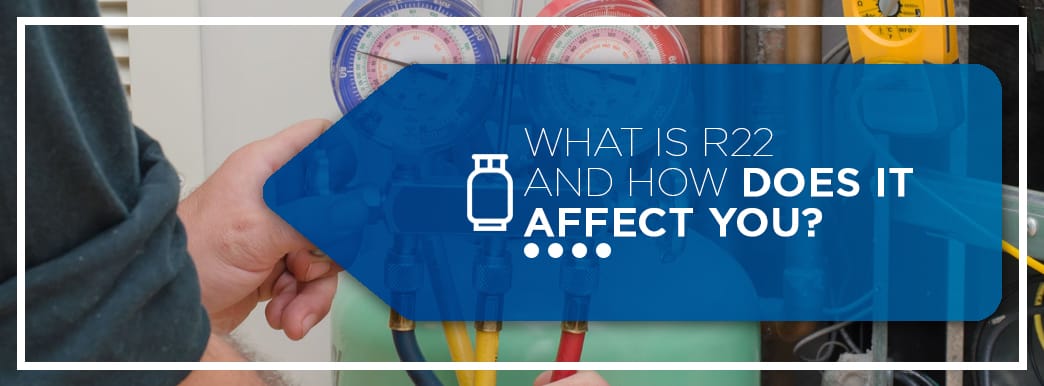
What is R22?
If your home’s air conditioning unit is more than 10 years old, there’s a good chance it uses R22, commonly known as “Freon.” R22 is an A/C refrigerant — a substance used for cooling in air conditioners— that was once widely used in air conditioning units in homes and businesses alike. But, after years of using R22 in air conditioning units of all sizes, it was discovered that R22 is a dangerous chemical that was significantly contributing to the thinning in the ozone layer.
Why is this a big deal?
The ozone layer exists to shield the surface of the Earth from dangerous ultraviolet rays that can lead to skin cancer, disrupted marine activity and reduced agricultural productivity. In other words, it impacts just about everyone and everything on Earth in one way or another.
In 1987, the U.S. Environmental Protection Agency (EPA) joined with several other global agencies to create the Montreal Protocol, an agreement that established a timeline for phasing out the use of these highly dangerous synthetic chemicals.
So what does all of this mean for homeowners? Keep reading to find out!
The Freon (R22) Ban: R22 and the Environment
Beginning in 2010, the EPA began implementing the Montreal Protocol in stages, beginning with a ban on manufacturing new equipment that used R22. Instead, A/C manufacturers were instructed to use one of several chemical alternatives that can be used as refrigerants without the risk of harming the ozone layer. In accordance with this ban, most units that were manufactured after 2010 won’t have R22 in them. However, any unit manufactured before 2013 should be checked to confirm that R22 is not present in the system.
When the Montreal Protocol established the “Freon Ban,” it acknowledged that homeowners with then-newer A/C units wouldn’t be able to just run out and immediately buy a new unit. So, it allowed for the continued use and maintenance of air conditioning units that already contained R22, including ways to obtain R22 for A/C unit maintenance and repair. During that time, it began to implement restrictions on how R22 was handled and required it to be treated as hazardous waste. They also began to require repair technicians to become EPA-certified to work on units containing R22.
Now, it’s time for the next phase of the Montreal Protocol’s ban on R22 to be rolled out.
Starting on January 1, 2020, companies can no longer produce or import R22 into the United States. Repair companies will only be permitted to use recycled or repurposed R22 to provide maintenance on older units. In other words, if your unit begins to leak, there’s not going to be an easy — or cheap — way to replace what it’s lost.
How Does the R22 Ban Affect You?
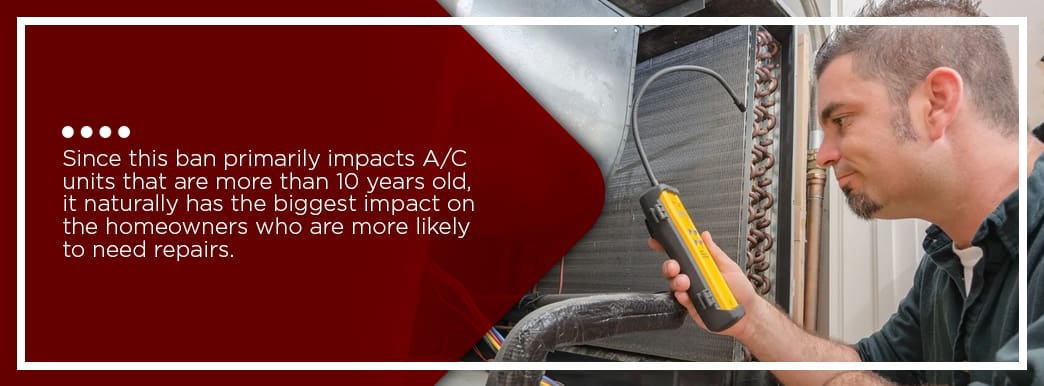
So how does a decades-old EPA agreement impact you?
If your A/C unit is more than 10 years old, chances are that it’s using R22. Because the ban prohibits the production of R22 replacement for these units, this latest step in the R22 phaseout means it’s going to become much more difficult — and expensive — to have repairs done on older units.
Why?
Once the ban takes effect, the only R22 that will be available to use will be recycled R22. A/C repair companies have limited options for where to buy R22 because there won’t be a way to get new supplies of R22, which means that it will be more difficult to obtain. Because of the limited supply, prices will naturally go up.
But there’s more to the problem.
Since this ban primarily impacts A/C units that are more than 10 years old, it naturally has the biggest impact on the homeowners who are more likely to need repairs. At the time when your unit is most likely to need repairs and possibly experience refrigerant leaks, you’re going to have the hardest time getting affordable parts and service.
Call HVAC Experts in Central PA
How Do I Know if My AC Unit Uses R22?
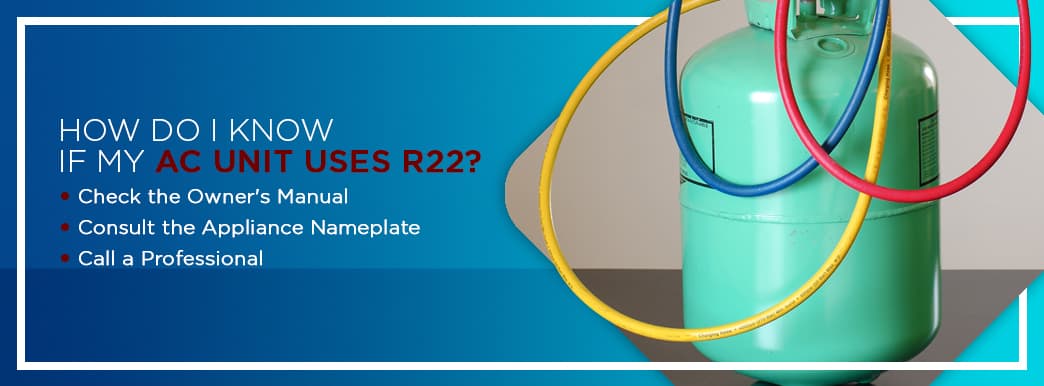
1. Check the Owner’s Manual
2. Consult the Appliance Nameplate
3. Call a Professional
Talk to an expert! 717-689-4151
R22 FAQs
1. Is R22 Illegal?
2. Should I Buy a Home With an A/C Unit That Contains R22?
Although it’s not illegal to own one of these systems, you may find yourself stuck with some hefty repair bills if that unit breaks once you own the home.
If you’re considering making an offer on an older home, inquire about the A/C unit. Then, if it does contain R22, decide how that will impact your decision. In some cases, potential homeowners use this information to negotiate down on the price. In other cases, they may simply plan to replace the unit once they assume ownership. But, if you’re in the market for a house you don’t have to put much money into, then a home with an R22 unit may not be the right choice for you.
3. Is My Existing Unit Hurting the Environment?
There’s no easy answer to this question. R22 is a greenhouse gas. Any time R22 escapes into the atmosphere, it contributes to the depletion of the ozone layer. However, in an A/C unit that’s in good working order, R22 is contained inside of the unit, and there is nowhere for it to go. For R22 to escape into the atmosphere, it has to be released from your A/C unit. This happens when a leak occurs.
The best way to prevent it from escaping into the atmosphere is to prevent leaks. This can be accomplished by keeping your older system in good working order. Arrange for regular preventative maintenance with an experienced, trustworthy technician who can identify small problems before they become big ones. If you have your unit serviced regularly, an experienced technician should be able to identify and repair small leaks quickly, and there won’t be time for much R22 to escape.
4. How Do I Find an EPA-Certified Technician?
What Are My Options if My Current AC Unit Uses R22?
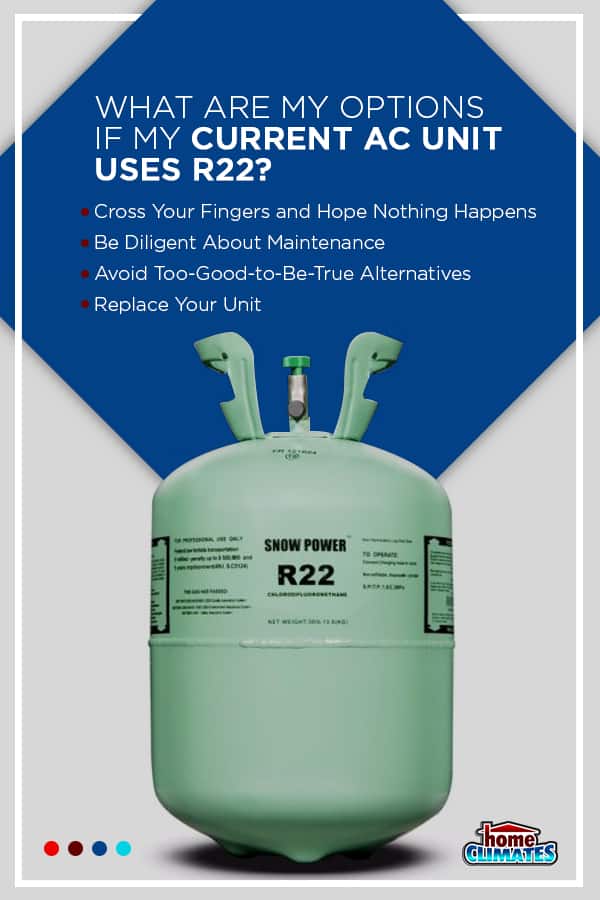
The average lifespan of an air conditioning unit is 15 to 20 years. This means that any unit built before 2010 is already nearing its twilight years. Even if your unit is older, if it’s still humming along, it’s tempting to shelve the problem and leave it for another year.
But should you wait?
The truth is that even A/C units that were built 10 years ago may be costing you 20-40 percent more in energy costs than their newer, more energy-efficient counterparts. Add those additional energy costs with the increased cost of R22, and it just may not be worth putting off a replacement.
So what options are available to homeowners with an A/C unit that still uses R22?
1. Cross Your Fingers and Hope Nothing Happens
You could opt to do nothing. The Montreal Protocol does not demand that homeowners remove existing A/C units that contain R22. However, you run the risk of your A/C breaking on the hottest day of the year, then paying a lot of money and waiting days for a new one to be installed. Even if nothing happens to your unit, an older unit could also cost you if you plan to sell your home and want to get top dollar for the sale.
Being proactive about your home’s A/C unit pays off in the long run — and keeps you cool when it counts.
2. Be Diligent About Maintenance
Obviously, doing nothing isn’t a great option. So what’s next?
This New Year, resolve to make your A/C unit a priority. Scheduling regular, proactive maintenance will extend the lifespan of your existing unit and protect you from unforeseen problems while you pursue a viable long-term solution — replacement! Regular maintenance isn’t a long-term solution and should only be used as a short-term solution while you’re investigating your replacement options and waiting for a new unit to be installed.
A new unit is an investment. And it’s one that you shouldn’t take lightly. Being proactive about maintenance also buys you time to save money for the unit you need. Although we don’t recommend waiting too long, it may be beneficial to keep up on maintenance while you save money or determine the best way to finance a new unit.
3. Avoid too Good to be True Alternatives
You might have heard that there’s an option that will allow you to swap out R22 for an EPA-approved alternative, such as R410-A. While this sounds like a great solution, it isn’t a practical option. In fact, this is often just as expensive as replacing an existing unit with a new A/C. Why? R22 relies on certain system components within the A/C unit that aren’t compatible with other refrigerants. So, if you were to swap out the refrigerant itself, you’d also have to replace a lot of the parts inside of the system. By the time you paid for all of this tedious and time-consuming work, you’d have paid about the same price as you would for a new unit.If your unit is older, there’s also a chance that it’s split into two parts — an outdoor compressor and an indoor unit. The R22 is contained in the outdoor compressor, so some people come to us hoping that they can simply swap out the outdoor compressor and leave the inside portion intact. Unfortunately, this isn’t always possible and isn’t likely to save you money in the long run.
4. Replace Your Unit
It’s tempting to hang on to the unit you have in the name of being frugal, but hanging on to a unit that runs on R22 may cost you in the long run. The initial costs of an R22 system replacement may feel high, but consider this: the cost of repairing your existing unit combined with the higher energy costs that are typical with an older unit may ultimately cost you more than going ahead with a replacement. For this reason, we always recommend replacing your A/C unit before it breaks and you’re stuck in an emergency situation.
Learn more about hvac replacements
Contact Home Climates for Air Conditioning System Tune-Ups and Installs
Although these guidelines may be a surprise to you, the heating and cooling industry has been preparing for them for quite some time. At Home Climates, our EPA-certified technicians are available to service existing units, answer all of your questions and put your mind at ease about how these changes impact you. If your A/C unit is older, then we recommend investing in a new, energy-efficient model that will save you money on energy costs and protect the environment at the same time.
Serving Elizabethtown and surrounding Central Pennsylvania locations, Home Climates offers a five-year labor warranty and a 10-year parts warranty on our work. That’s a whole decade of peace-of-mind when it comes to your air conditioner. We also guarantee that our technicians have been background checked, and you’ll always feel safe and secure while they’re working in and around your home. But, if that’s not enough, you might also like our one-hour window guarantee. Unlike other companies that make you block off up to four hours of your day to wait for a technician when you schedule an appointment with Home Climates, you’ll get a one-hour time window for our arrival. We don’t like to wait — and we know you don’t either.
For air conditioner service or replacement, don’t wait. Make an appointment with Home Climates today.
Interested in AC System Tune-Ups?

Home Climates Review Scored as of 9/22/22

